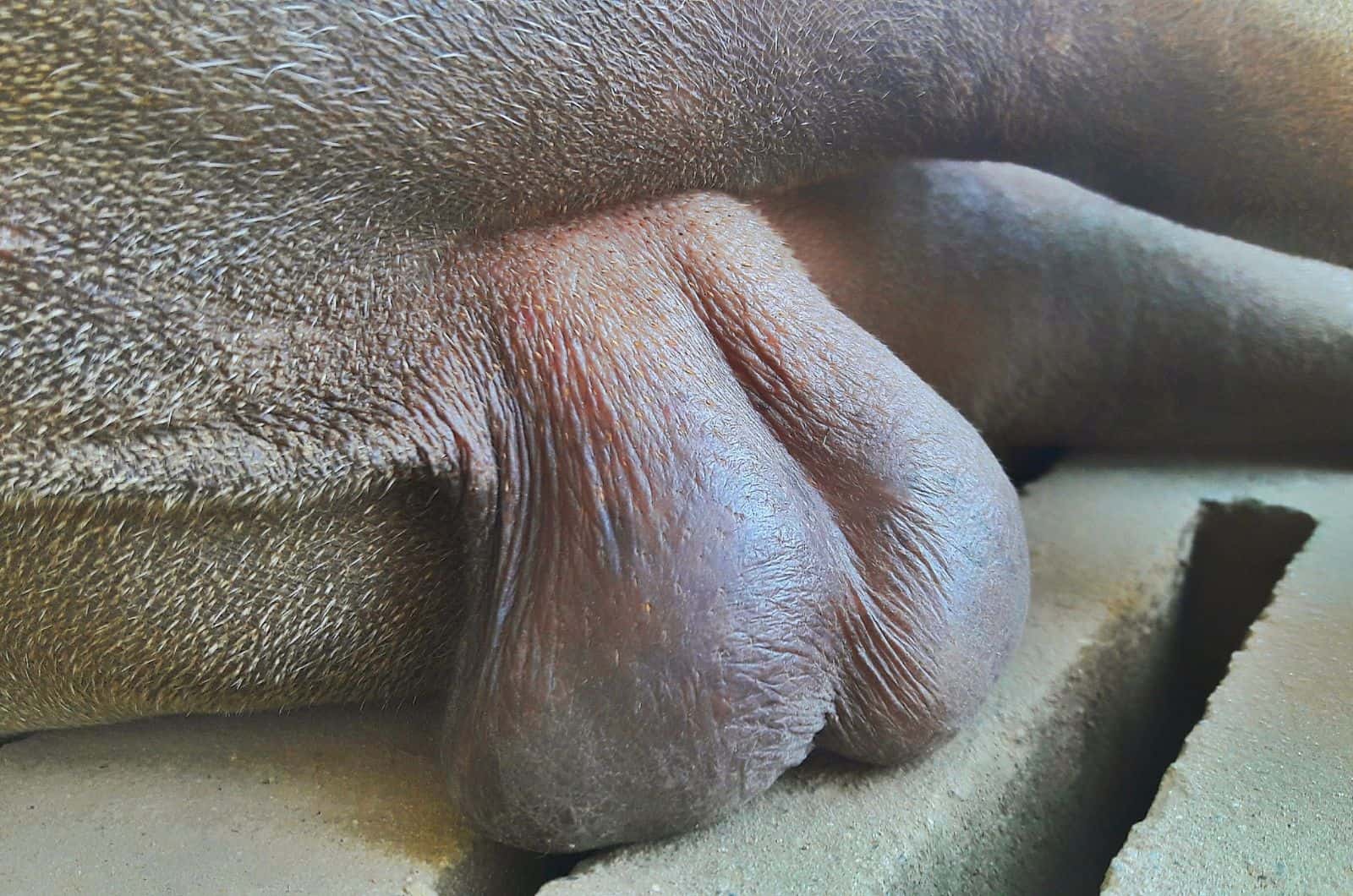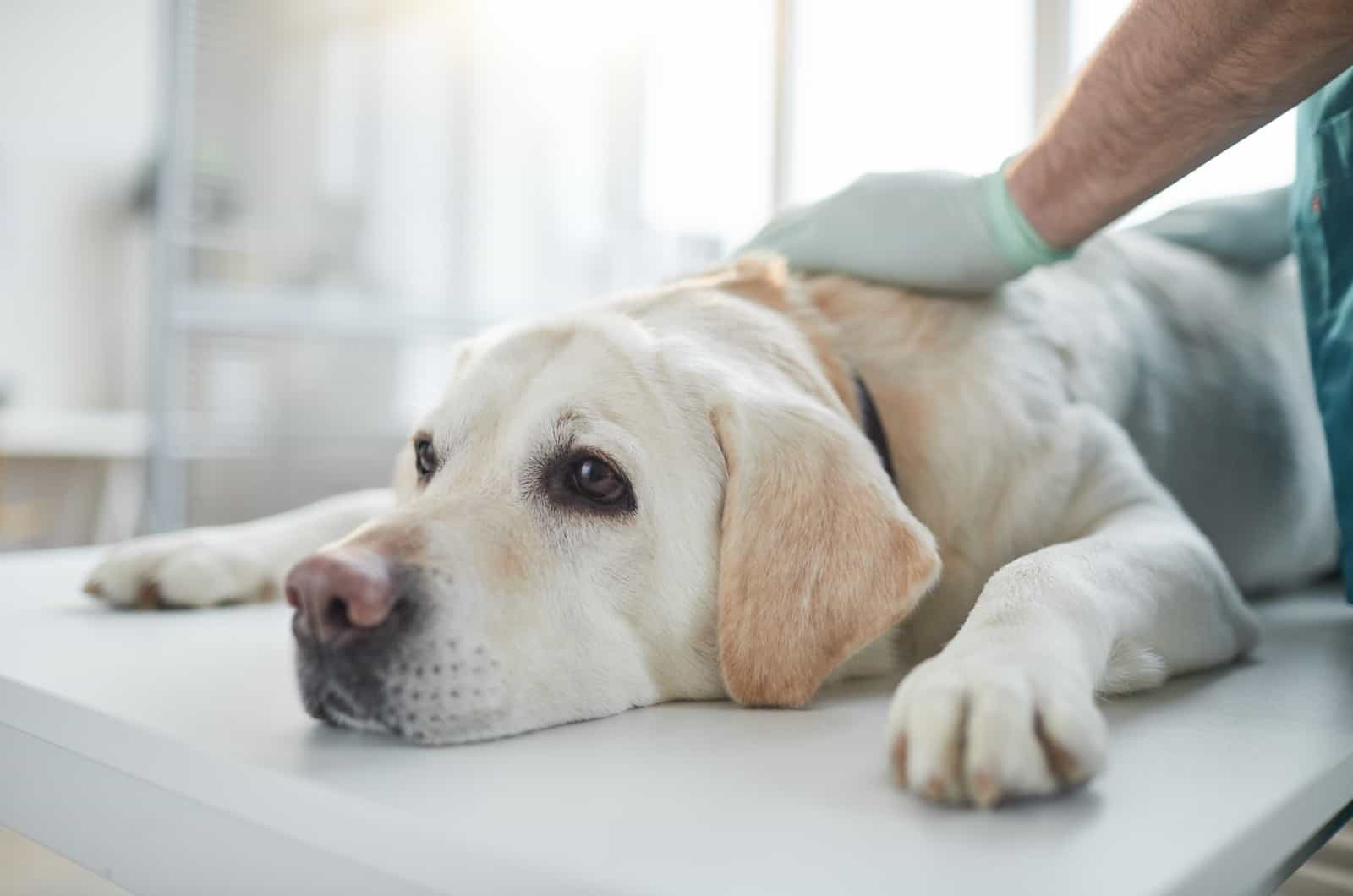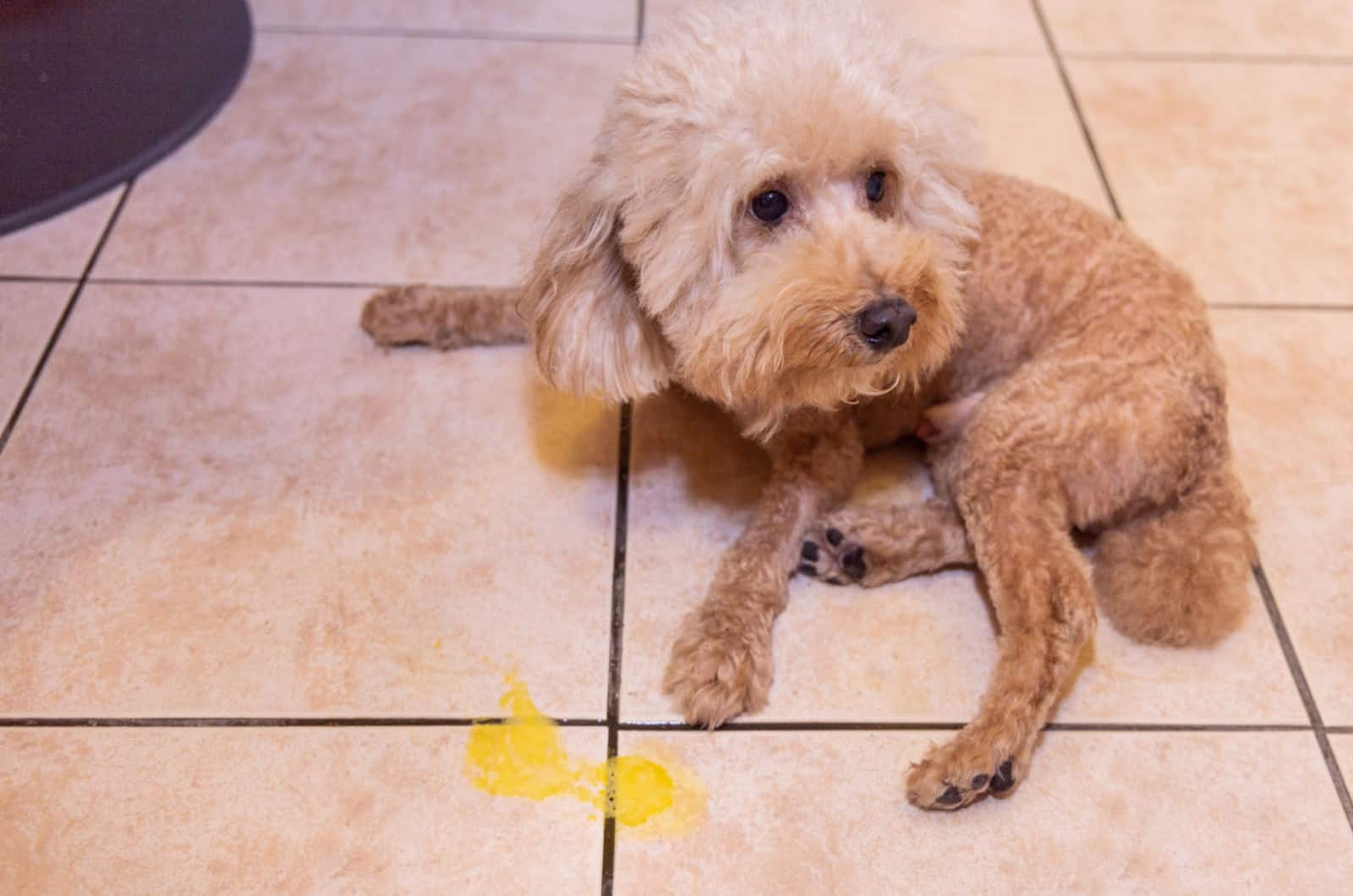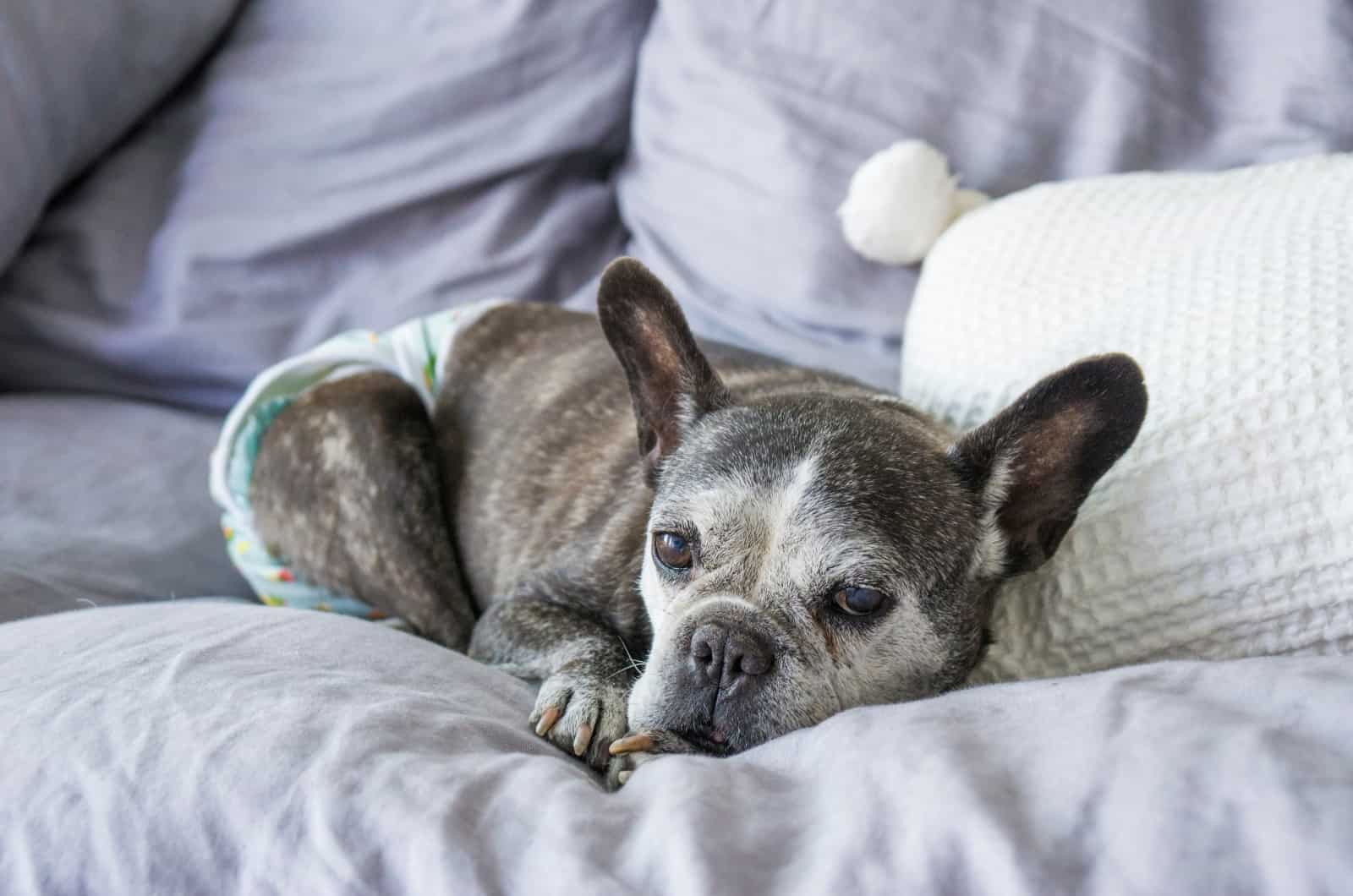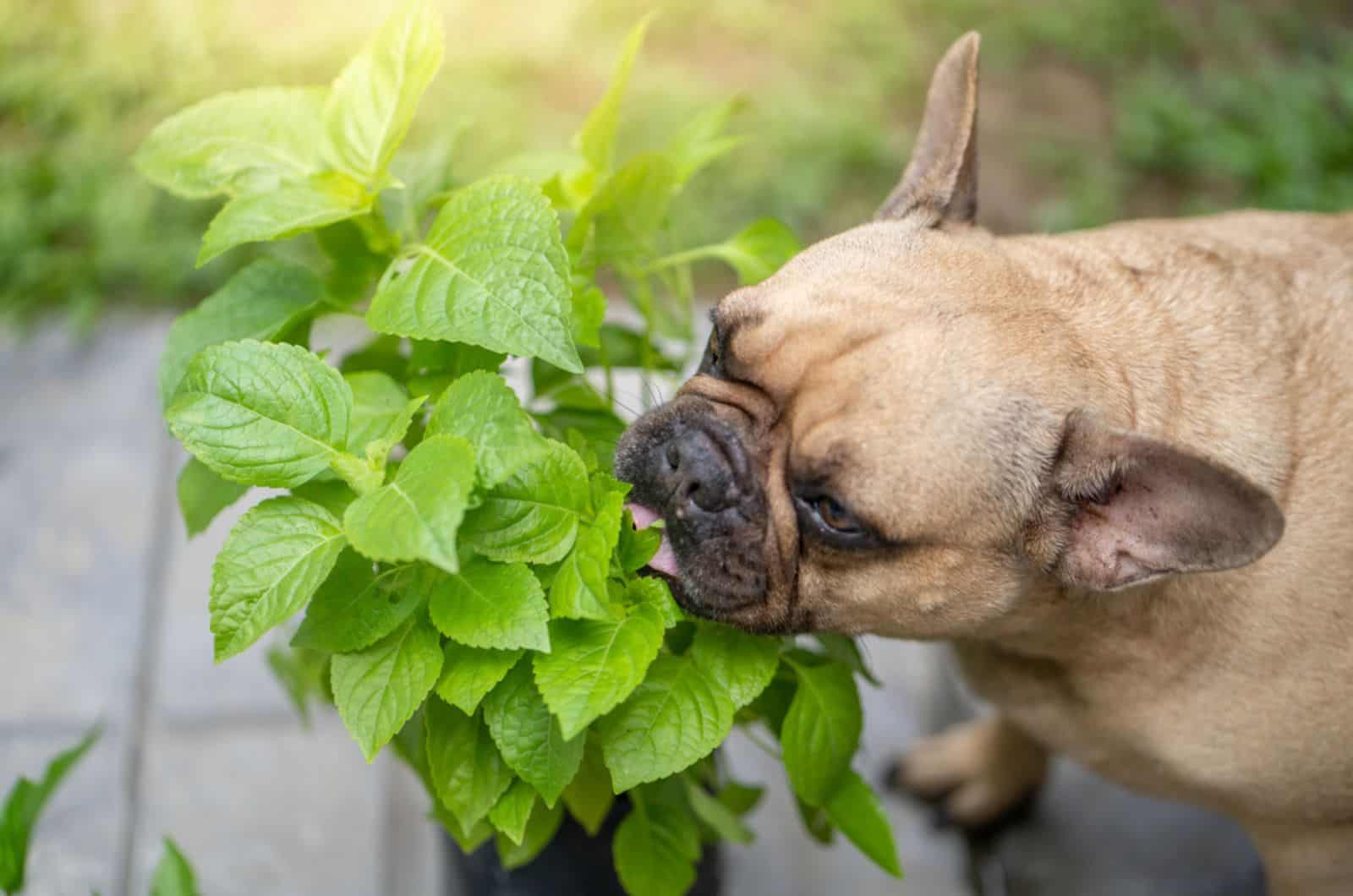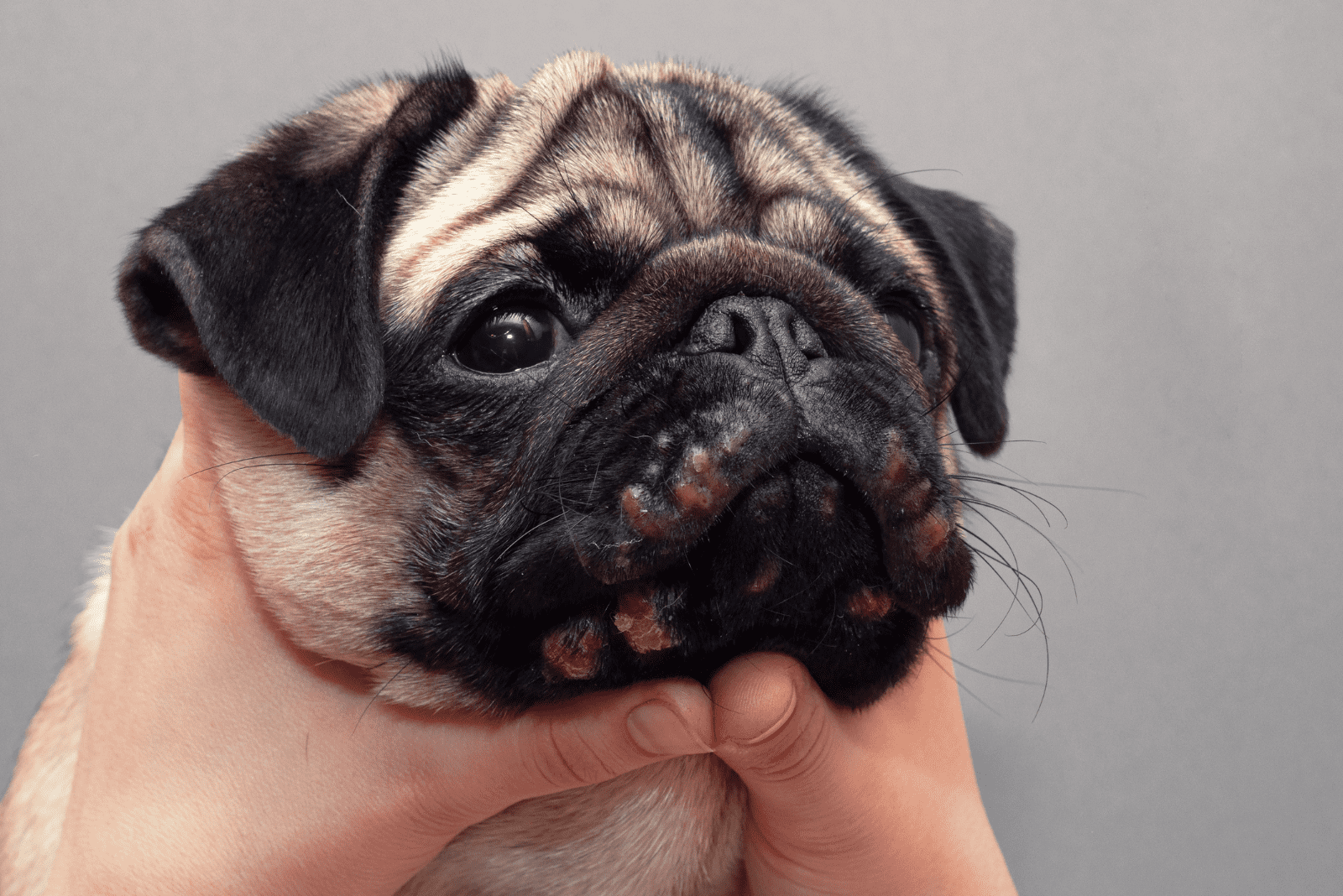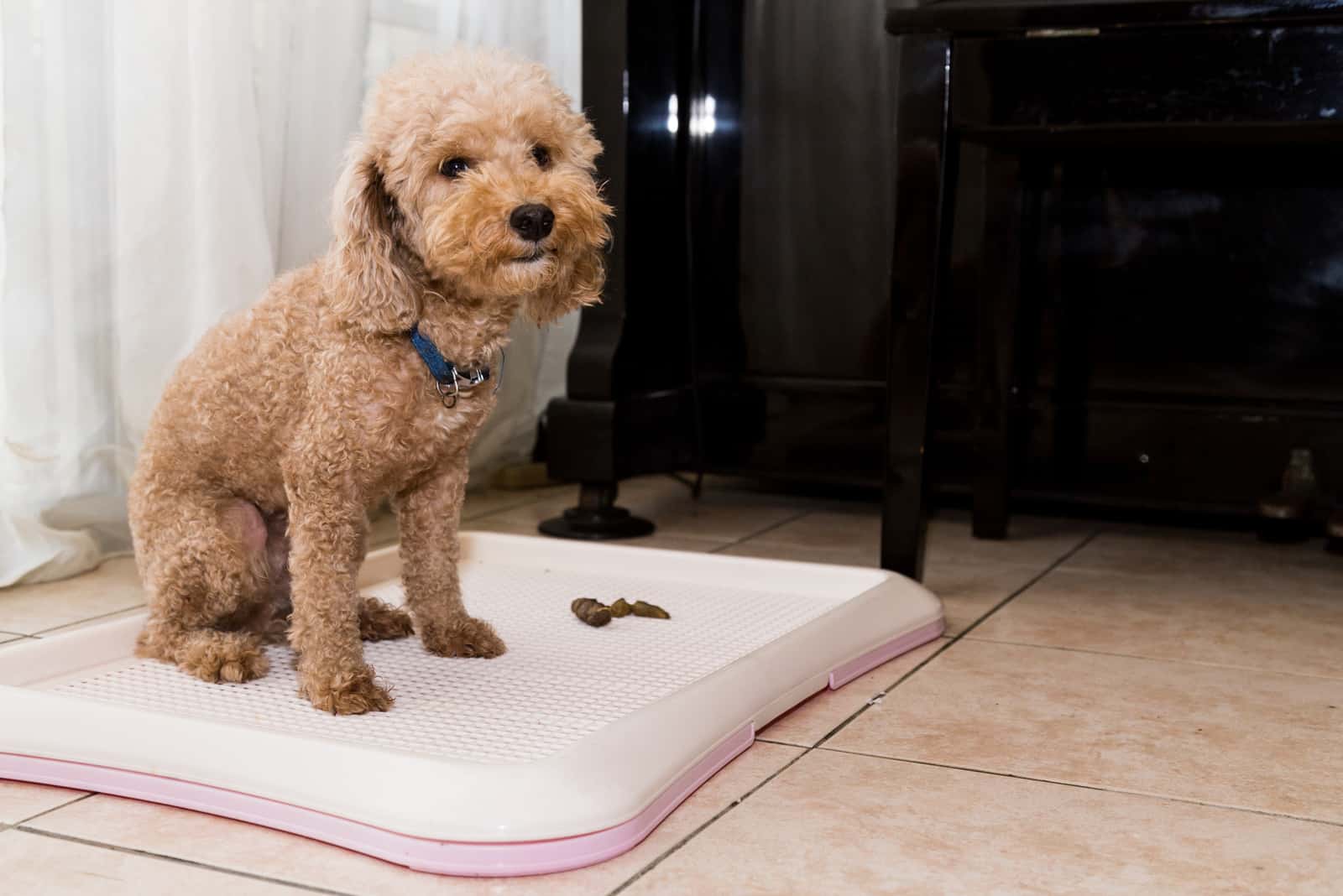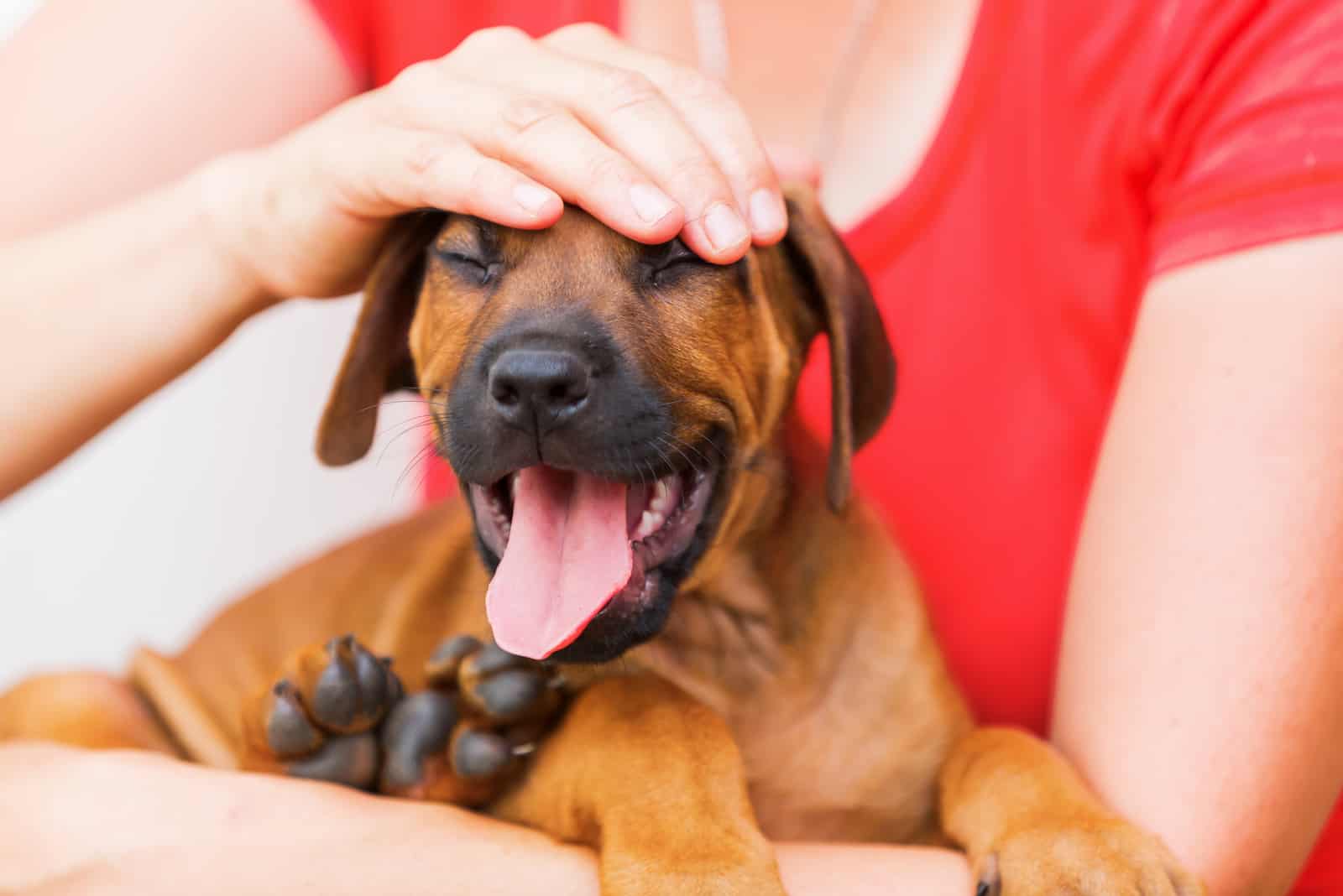If you find yourself thinking, ‘Why is my German Shepherd so itchy?’, you have arrived at the right address.
German Shepherds have an extremely thick coat of fur that is made to shield the dog from several dangers.
However, GSDs also have a propensity for skin conditions and allergies, which can lead to excessive scratching and pain.
I am sure that you are aware of how irritating it is to have an itch that won’t go away.
Why Is My German Shepherd So Itchy?
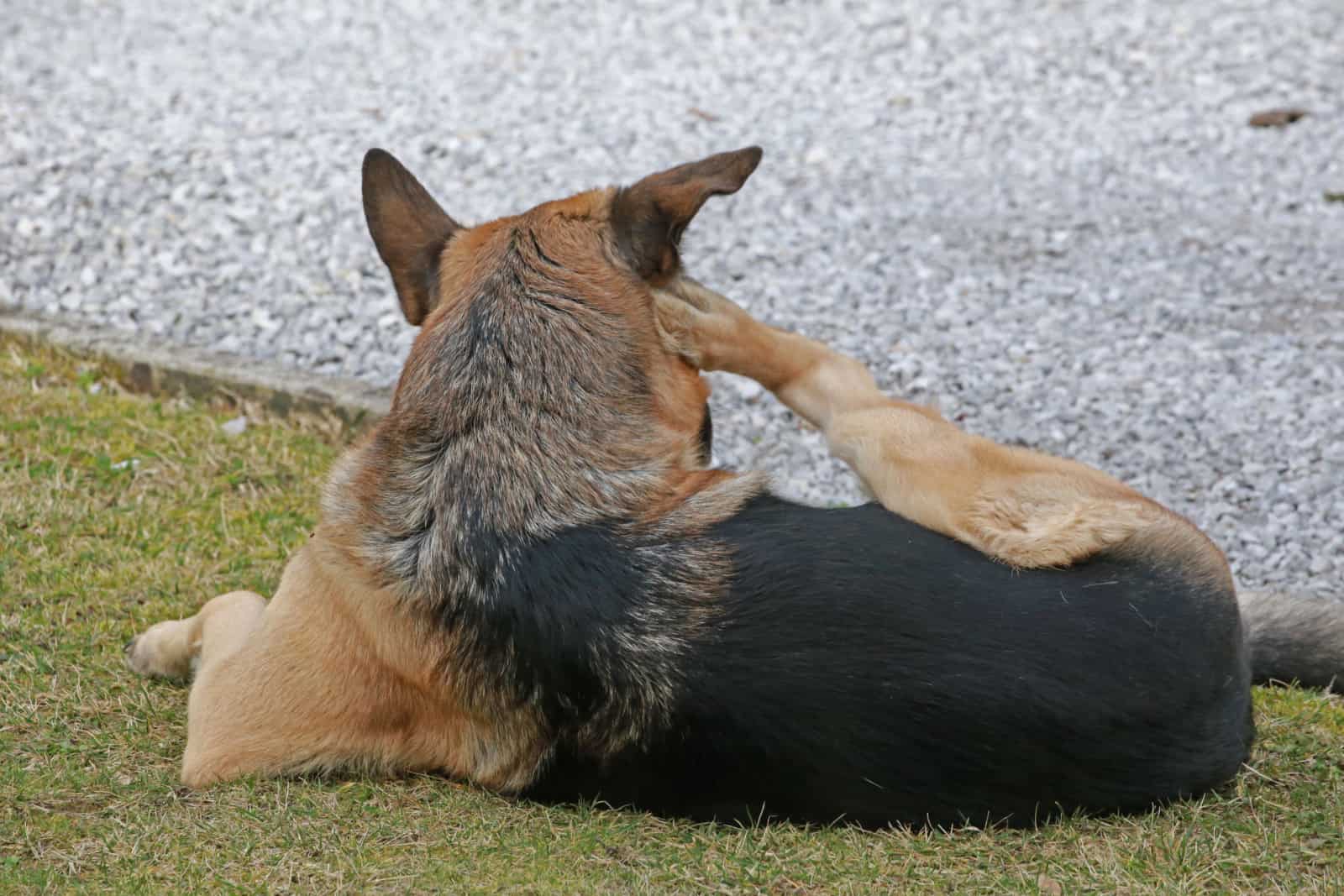
Watching your dog scratch, itch, scratch, itch, and scratch nonstop while unsure of how to make your dog feel much better could be very upsetting.
Since there could be various reasons behind the question, ‘Why is my German Shepherd so itchy?’, we are going to cover all of them. Buckle up!
1. Skin Allergies
Naturally, both humans and animals are susceptible to allergies, which are the result of the immune system’s mistaken response to foreign chemicals. Dogs can develop a variety of various allergies.
Dogs and their owners face difficulties as a result of skin allergies, food allergies, and environmental allergens. To make matters more challenging, the symptoms of these many forms of allergies may also coexist.
Environmental allergens like dust, pollen, and mold can result in atopic dermatitis or allergic reactions in susceptible individuals. Since these allergies are typically seasonal, your dog may only itch at particular periods of the year.
The paws and ears are typically impacted, just like with food allergies, but also the groin, the underarm area, the area around the eyes, etc.
Secondary infections are possible with all types of skin allergies. Your dog runs the risk of exposing himself to bacterial and yeast infections that may need scratching, biting, and licking at his skin.
2. Doggy Pyoderma

Canine pyoderma is an extreme case of skin irritation that requires veterinarian involvement and treatment as described in Veterinary Practice.
Bacteria are the cause of pyoderma. Researchers in the field of veterinary medicine are still trying to determine how it begins, and why certain dogs are more vulnerable than others.
The German Shepherd dog is one of several canine breeds that have underlying sensitivities to diet, environment, allergies like pollen, and pests.
Research on dogs suggests that GSDs may be more susceptible to pyoderma due to an underlying immune system problem that may also be hereditary.
Pyoderma is difficult to treat, and it may come back frequently. A mixed-treatment strategy is typically needed.
After your German Shepherd is identified as having pyoderma, you might need to give him antibiotics, use medicated shampoos, switch his food, give him topical treatments, and test him for thyroid or immunological problems.
Pyoderma’s warning signals frequently start with severe bouts of itching and scratching.
This eventually results in skin lesions, which is when parasites, fungi, bacteria, bugs, or other opportunistic organisms invade and populate the skin.
3. Atopic Dermatitis
According to Aubrey Animal Medical Center, German Shepherds are a breed that is particularly prone to allergies.
However, “atopy” is the more prevalent term for allergies in canines. Many dog owners are unaware that their dog’s frequent scratching is essentially equivalent to your frequent sneezing.
In other words, just as allergies can cause your nose to run and your throat to itch, they can also cause your dog’s skin to itch severely.
However, dogs can’t itch and rub as well as you can. So, instead of constantly scratching, you might witness your German Shepherd rubbing, licking, biting, or pawing at the irritated area of the body.
Atopy increases the likelihood that certain regions of your dog’s skin may get scratched more frequently. The paws, ears, belly, tail area, folds in the skin, and ears are some examples of these locations. Your dog’s body may itch in different places depending on the allergy.
For instance, “Frito feet” is a condition brought on by a specific type of bacteria that frequently invades a dog’s paw pads in the space between the toes, and it emits the smell of corn chips.
Between the ages of one and three, German Shepherd owners are also most likely to notice their dogs suddenly begin scratching, biting, stroking, pawing, or licking at specific regions.
Although it can occur at any time during your dog’s life, this is the time when atopic dermatitis is more likely to start manifesting.
4. Demodectic Mange

According to the American Kennel Club (AKC), German Shepherds develop demodectic mange, often known as Demodex, from a distinct kind of mite.
The primary distinction between lice and Demodex is that the former is an unmistakable invader, while the latter is perpetually present on the skin.
Normally, the mites will live in peace within the hair follicles, provided your German Shepherd maintains good health and a robust immune system.
However, the mites might begin to itch if the immune system is compromised in any way.
Patchy hair loss, rather than severe itching, is the most typical warning symptom. Although some puppies may get this problem, it often only happens when your dog has a major underlying illness, such as diabetes, that weakens its system.
In addition to oral antibiotics or allergy medications, your veterinarian may advise trimming your dog’s fur closely, or utilizing dips, medicated washes, or other remedies.
5. Fleas
According to Greencross Vets, a flea problem is just one potential cause of your German Shepherd’s itching.
It is true that fleas can aggravate the skin to the point that other opportunistic bacteria, fungi, or parasites can enter and create additional itchiness and irritation.
However, a dog that itches frequently doesn’t even have fleas. Something altogether else is to blame for the itching.
But, if your dog has a flea allergy in addition to having even a minor flea infestation, the itching may become much worse. It is known as flea allergic dermatitis when this occurs. An allergy specifically to flea bites is called flea allergy dermatitis.
Any animal (or human) that has been bitten by a flea has itching, but in infected dogs, the itching becomes intense, and it is frequently centered around the tail area.
One flea bite or culprit is all it takes for dogs with serious flea allergy dermatitis to start scratching.
6. Mites
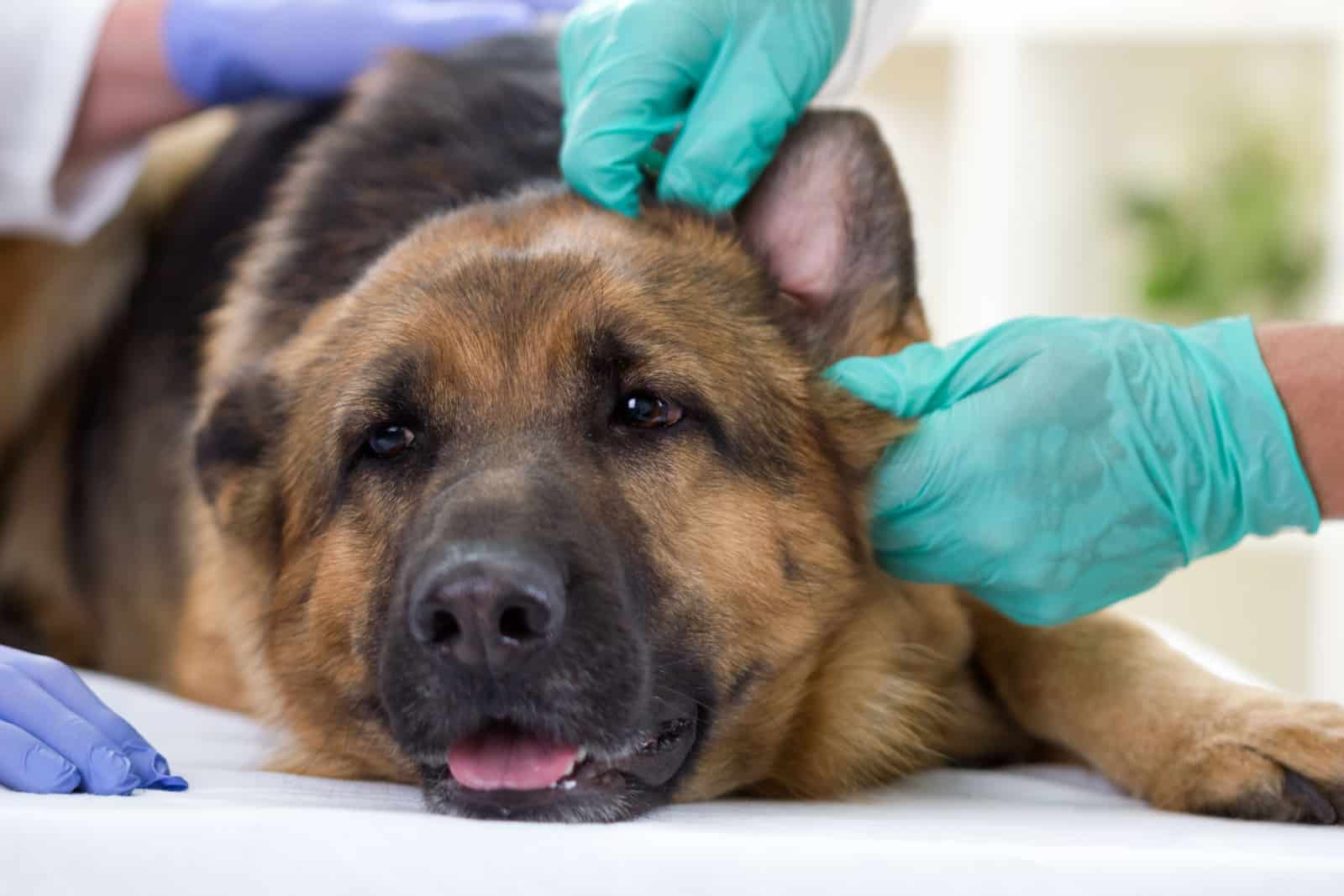
Mites are another factor in sudden outbreaks of scratching that don’t appear to have an underlying cause.
The dead skin cells that your dog sheds serve as a food source for mites, which are incredibly tiny parasites. They may sound like flea-like insects, but they are actually spiders that have developed a parasite.
Small white flecks that seem to be crawling on your dog’s coat are most likely mites carrying about their diet of insignificant skin flakes.
Due to the fact that these parasites are “zoonotic,” you should not put off treating your dog for mites. It follows that the mites may transfer from the dog to you.
Additionally, the longer you put off getting a diagnosis and starting treatment, the more likely it is that a mild mite problem will develop into sarcoptic mange, often known as scabies, which is a far more serious condition.
When the adult mites mate, the females deposit eggs in your dog’s skin. When the eggs hatch, the young mites start to move about and cause severe itching.
Sarcoptic mange is unfortunately difficult to detect because the signs resemble several other skin allergies as well as ailments that can affect German Shepherds.
A number of tests and an exclusion of other problems may be required by your veterinarian.
Your dog will likely require a variety of treatments, which include antibiotics, topical washes or solutions, oral medications, dips, and external itch-relief items even after a definitive diagnosis has been made.
7. Dog Food Allergy

Food allergies in dogs are a growing concern for dog owners nowadays. In fact, according to recent estimates, up to 10% of all canines in existence today may experience some level of food allergy. It’s interesting to note that dietary allergies are also becoming more common.
While there are several potential candidates, including GMOs (genetically modified organisms) and global pollutants, experts are not entirely clear what is causing this rise in interspecies food allergies.
In German Shepherds as well as in other dog breeds, specific foods have been shown to be more likely to cause food allergies. Among the most often mentioned food-based allergies are those involving rabbit, pig (pork), chicken, fish, cattle, eggs, dairy, soy, and wheat (gluten).
Are German Shepherds More Prone To Food Allergies Than Other Dogs?
A German Shepherd could, however, be sensitive to other foods. For instance, it is well known that peanuts are more likely to develop fungus, which, in certain dogs, can result in severe allergies.
It is crucial to determine which foods cause the scratching since you must be sure to remove them from your GSD’s diet.
Even though your dog was able to consume the food item in the past, sensitivity may develop with time, and it could be required to cut it out of the diet moving ahead.
According to one view, commercial livestock farms frequently provide antibiotics to young animals and breeding animals in an effort to prevent disease and infection.
The antibiotics in the meat cause digestive problems in your dog by killing some of the “good” essential bacteria that live in their intestines.
Allergic reactions from food allergies may vary extremely. It really depends on the allergens in that specific food; however, the usual symptoms are itching, bloating, swelling, loose stool, and vomiting.
German Shepherds are among several breeds that are inherently more susceptible to suffer food allergies.
Working with your dog’s veterinarian to determine which foods the GSD is sensitive to, and removing those from its meal is the best course of action. To focus the search, your veterinarian will probably perform some allergy testing.
Adopting a restricted-ingredient diet is another approach that many veterinarians advise, first to determine whether the symptoms go away on their own.
Ways To Help Your Itchy German Shepherd Dog
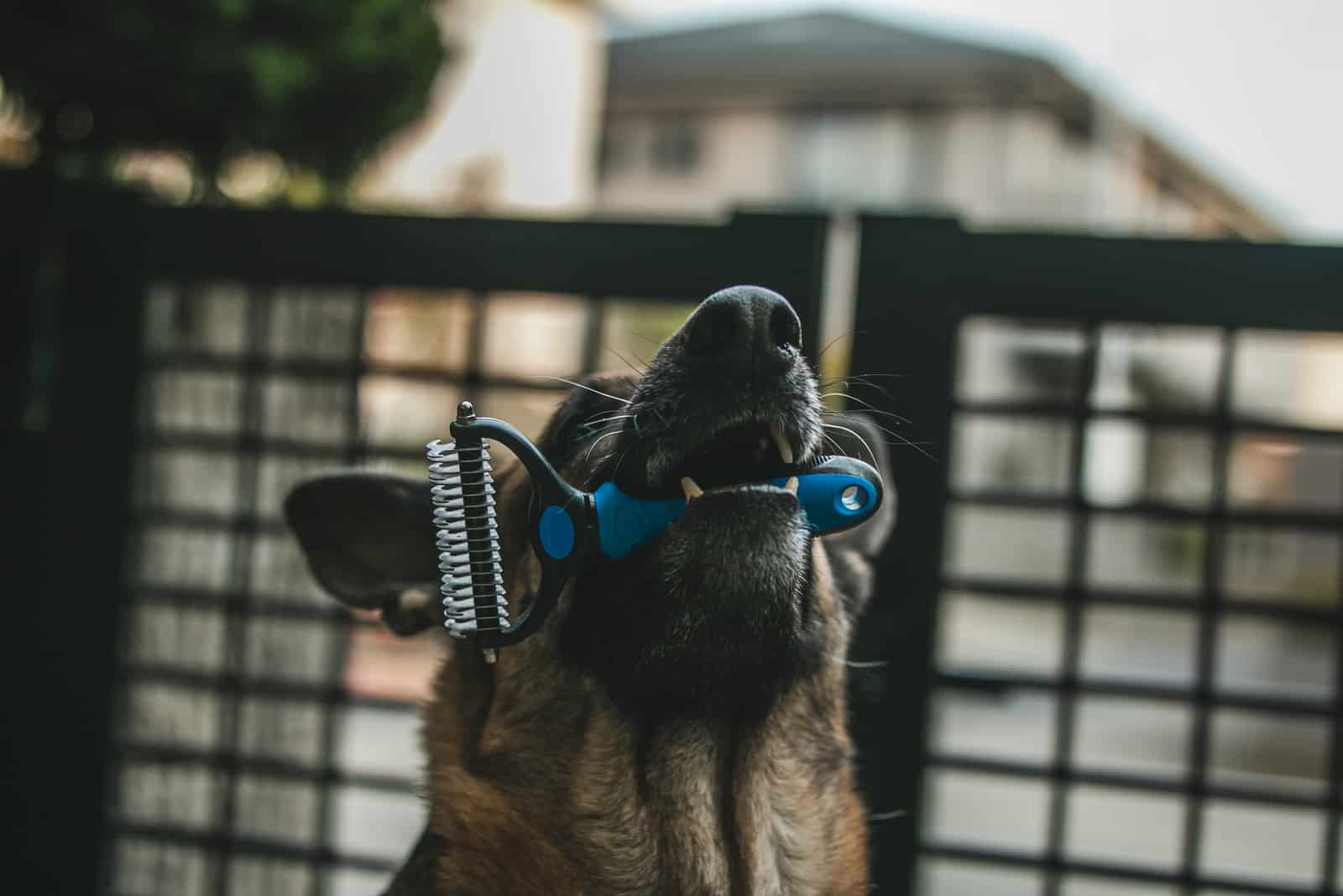
We’ve already talked about the effects of parasites like mites, insects including fleas, and food sensitivities (or allergens that could cause a lot of skin itching).
It can be challenging to discern what is going on behind the German Shepherd’s thick dual layer of fur because of how thick and concealing its coat is. Regular grooming and brushing might assist you in identifying emerging issues before they spiral out of hand.
Going forward, whenever you comb your dog every week, take some time to look for any indications of skin redness, problem areas, discomfort, or inflammation on the joints, face, ears, and belly area.
Keeping a journal might also be helpful so you can document the events leading up to your dog’s episode of scratching.
Does your dog appear to scratch more during or after meals? These are important hints that can aid in accurately diagnosing and treating the itching problem.
There are a few ways in which you can help your German Shepherd dog feel better and less itchy. Let’s look at those ways!
1. Reducing Exposure To Cleaning Products
Your dog might itch from using cleaning supplies that are sold commercially. Your dog may experience adverse reactions to some substances or have breathing problems.
There are many cleaning supplies that are made naturally that will reduce your dog’s responses.
Look for items that are hypoallergenic and free of aroma. Before letting your dog approach any material that has had chemicals sprayed onto them, give them time to thoroughly dry out.
2. Do Allergy Testing
Dogs might have negative reactions to a variety of allergies, including the vegetation in your back yard, the shampoo you use, and the food it consumes.
Additionally, it can be very challenging to determine the actual reason for your dog’s troubles because the symptoms of canine allergies are so alike to those of other health conditions.
When you see your dog scratching excessively, it could be time to bring it to the doctor for allergy testing to determine the source of the problem and start it on an allergy treatment plan.
The blood test approach, which just needs a blood draw, is less intrusive, but may also be less accurate than intradermal testing.
The blood will be tested by an outside laboratory for allergen sensitivity, and the results can be utilized to create a unique allergy solution for desensitization therapy.
3. Add Supplements To Their Everyday Meals

You might also want to add rich omega-3 and omega-6 fatty acid supplementation to your dog’s diet in addition to the nutrients indicated above. Also, salmon oil is a great way to fight the itchiness.
These will aid in reducing skin irritation, which may be the root of your dog’s itching. Their coat will become glossier and more opulent as a result, further enhancing their appearance.
We advise utilizing an oil mixture, such as hemp and salmon. This will work well to build a healthy coat as well as skin, and it is unlikely to cause an adverse reaction.
All you have to do to feed it to them is sprinkle some oil over their kibble when it’s time for a meal.
Results won’t show up right away when you start giving your dog the oil blend. The benefits probably take between four and six weeks to become apparent.
Before the cold season arrives, we urge you to start adding this fatty supplement to their diet. This will reduce the likelihood that your German Shepherd will get sick or itchy throughout the winter.
Additionally, we advise feeding your German Shepherd probiotics. These will support their digestive and immunological systems. Also, probiotics will reduce the body’s inflammatory reaction to any allergens in the environment.
There is proof that these vitamins may also assist in shielding your German Shepherd from immunological attacks.
4. Change Their Diet To Something More Simple
As we previously said, a food allergy may be one of the factors causing your German Shepherd to scratch. There are numerous varieties of sensitive and hypoallergenic dog foods.
These have been carefully created to minimize the possibility of allergic reactions. This is a great first step because it is a relatively inexpensive way to try to stop your dog from scratching.
Although it’s doubtful that your dog’s nutrition is the only factor contributing to its itching, it can significantly exacerbate other underlying problems. You can probably make them feel less itchy by minimizing the problems their body has to deal with.
Dairy protein, chicken, veal, cattle, gluten, and soy are typical allergies in dog food. As part of its immunological reaction, your dog’s body will develop antibodies and antigens if it is allergic to either of these substances.
For eight to twelve weeks, you will need to feed your dog a hypoallergenic diet that needs to be carefully monitored. This diet does not permit feeding your dog treats or supplements, and it cannot include any item that your dog has taken in the past.
As an alternative, if your dog is not receiving proper nutrition, it could become itchy. It could be vitamin, carbohydrate, protein, or fat deficient. Your veterinarian will also learn this from a blood test.
The protective layers of your dog’s skin may become disturbed as a result of malnutrition. Itching may result from this as well. Therefore, feeding your dog the proper diet will help keep them healthy.
5. Change The Products You Bathe Your GSD With
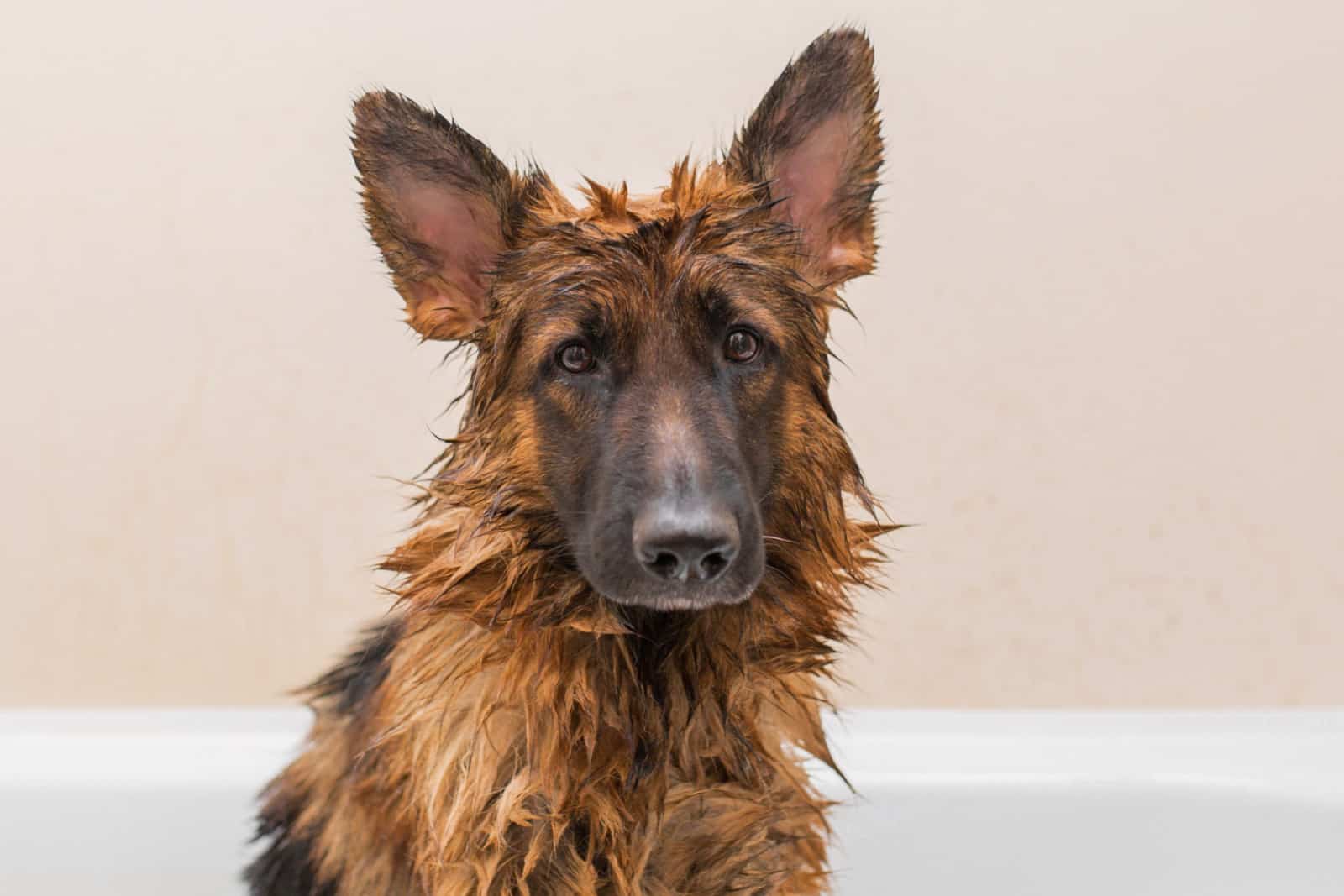
Itchy dogs can be effectively treated with a variety of medicated shampoos. These will assist in soothing their irritated skin and reducing the itching. They are incredibly easy to use, and reasonably priced to buy.
A substance called coal tar ought to be present in your shampoo. As it is highly soothing on cracked and irritated skin, this is frequently used as a therapy for eczema and psoriasis.
Additionally, it is a very successful therapy for dandruff and excessively greasy fur.
Shampoos made from coal tar are available for both humans and dogs. Use a shampoo made specifically for dogs because the human kind may have a pH that irritates your dog’s skin.
Avoid bathing your dog too frequently as this can potentially cause issues. You risk robbing your dog’s skin and coat of its natural oils if you overwash them.
This may possibly result in increased itching and consequences. It is advisable to bathe them every three to four months, or more frequently if your veterinarian advises.
To make sure all shampoo residues have been removed from your dog’s coat, you should always give them two good rinses.
6. Use Moisturizer On Their Skin, And Wash Them Regularly
To cure your German Shepherd, there are countless distinctive hydrating skin sprays and lotions on the market. These assist in keeping their skin moisturized, which reduces irritability and itching. This can aid any kind of skin issue your German Shepherd’s skin may have.
Sprays are quite easy to use during the day, and they won’t be too inconvenient for you. Look for sprays and creams with vitamin E and aloe vera in them. Both of these will greatly benefit your dog, and are very hydrating, especially if your dog has dry skin.
Apply freely where it appears to be most needed. These sprays have been scientifically created to provide veterinary-quality results at your convenience. Also, Sudocrem often helps!
Use an ointment or a heavier cream for a stronger impact on very itchy and afflicted regions. Small cuts as well as blisters can also be treated with this for immediate relief. During allergy seasons like the late spring and summer, this step is crucial.
Once your dog enters your home, it might be a good idea to wipe its legs, feet, snout, and tummy with hypoallergenic wipes.
As a result, they will be less exposed to grass and pollen, which may reduce allergy symptoms.
7. Brush Them, But Cut On Perfume Spray
The oils on your dog’s skin and coat will be more evenly distributed if you brush their fur. Additionally, it will aid in getting rid of any stray hair that could be aggravating them.
We advise brushing your German Shepherd two to three times a week with a rake brush that has rounded tips. You must regularly brush your dog during the spring and autumn seasons when they shed a lot.
This is due to the fact that they will be shedding a significant amount of fur, and would require assistance to prevent the dead hair from just accumulating in their coat. If your dog stays indoors, it probably sheds a little less than dogs that reside outside.
We advise using a rake brush. This kind of brush can remove dead hairs from the undercoat of German Shepherds, which have two coats of hair.
They are extremely sensitive to smells since they have a sense of smell that is more than 300 times more powerful than a human’s.
There are numerous scents that might potentially aggravate and injure your dog, including patchouli. Use of air fresheners or perfume sprays may exacerbate your German Shepherd’s problems if they are already itchy.
We advise against lighting fragrant candles or incense close to your dog. In the worst-case scenarios, you might want to think about giving up aerosol deodorant and fragrances.
Home Remedies For Itchiness

Using apple cider vinegar to cure your dog is an entirely natural option. To reduce itchy problems, rinse with this. After diluting it 1:1 with distilled water, put it in a bottle. It will at least help with hot spots, itchiness, and seasonal allergies as well as other skin problems.
You might think about including olive oil in their diet. Vitamins K and E, as well as antioxidants, are abundant in olive oil.
Plain yogurt is an additional healthy food to include in their diet. Make sure that it doesn’t include any sugar or additives as these are hazardous for your dog.
An additional effective and simple home treatment is coconut oil. It can either be used topically as a moisturizer for dry skin or given orally to your dog as the body’s immune booster.
Final Word
We have successfully answered the question, ‘why is my German Shepherd so itchy’, and made a complete guide on itchy skin, German Shepherd allergies, and some environmental allergies.
None of us want to witness our German Shepherd scratching uncontrollably and feeling uncomfortable all the time.
However, there are remedies for dry skin and allergies in German Shepherds that you can use immediately to stop your dog’s constant scratching.
Having a humidifier (with cool mist) would also help, as well as reducing the usage of heaters where your GSD (with a double coat) sleeps.
Your German Shepherd puppy might have problems with informing you that they have a problem with skin infections, and they might try to do it with a lot of barking.Try to give your dog the best dog food out there, together with dog training, and they will be more prepared to express their needs and problems.

